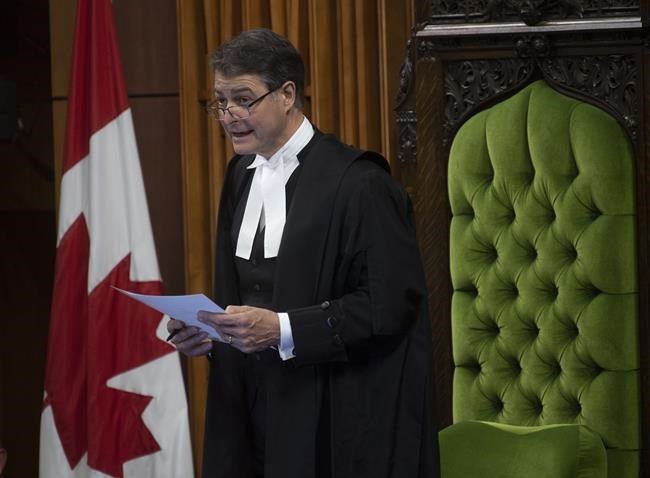OTTAWA — Conservatives want to invoke a rarely used procedure to publicly rebuke the head of the Public Health Agency of Canada over his refusal to produce unredacted documents related to the firing of two scientists from Canada's highest security laboratory.
Conservative House leader Gerard Deltell moved a motion Wednesday calling for PHAC to be found in contempt of Parliament and its president, Iain Stewart, to be summoned before the bar of the House to be admonished by the Speaker.
Stewart would also be expected at that time to hand over the documents that opposition MPs on the special Canada-China relations committee have been demanding for months, the motion says.
Deltell's move came shortly after Speaker Anthony Rota sided with opposition parties in ruling that the Commons and its committees have unfettered power to order the production of any documents they please, even those with national security implications.
Rota ruled that the Trudeau government has not complied with an order, passed by the Commons earlier this month, to produce the documents. As such, he said there's a prima facie case that it has breached MPs' privileges.
Normally, such a ruling would be followed by a motion of censure or a motion to refer the matter to a committee for further study.
But the Conservatives chose to go further, invoking what is arguably a nuclear procedural option that has not been used against a private citizen since 1913, the Library of Parliament indicates.
It has only been used twice since 1913, both times to reprimand MPs — New Democrat MP Ian Waddell in 1991 and Canadian Alliance MP Keith Martin in 2002. Both were hauled before the bar of the House — a brass rail meant to bar strangers from entering the chamber — to be reprimanded for grabbing the ceremonial mace during Commons proceeding.
Deltell's motion was debated at length Wednesday and will be put to a vote Thursday. If it passes — which seems likely given that opposition parties are united in their demand for the documents — Stewart would be required to appear before the bar on Monday.
Deltell argued that it's crucial for the Commons to take such a rare step because what's at stake is transparency, Canadians' confidence in their institutions, the powers of the Commons and the very preservation of democracy in Canada.
Opposition MPs on the Canada-China committee have been demanding the documents for months as they attempt to find out why PHAC terminated the employment of scientists Xiangguo Qiu and her husband, Keding Cheng, in January.
The pair had been escorted out of the National Microbiology Laboratory in July 2019 over what PHAC has described as "relating to possible breaches in security protocols."
The Winnipeg lab is Canada's only Level Four laboratory, designed to deal safely with deadly contagious germs such as Ebola.
Stewart and Health Minister Patty Hajdu have both said the pair's firing had nothing to do with the fact that Qiu oversaw a shipment of Ebola and Henipah viruses to China's Wuhan Institute of Virology in March 2019.
They've also said there's no connection to COVID-19, a coronavirus that first appeared in China's Wuhan province and which some believe may have been released accidentally by the virology institute.
Nevertheless, opposition parties are determined to see unredacted documents about the transfer of viruses to the institute and the subsequent firing of the two scientists and continue to suggest a possible link between the two.
Stewart has twice refused to comply with a committee order to produce those documents, saying federal Justice officials have advised him that would be a breach of privacy laws, could interfere in an ongoing police investigation and jeopardize national security.
Opposition parties joined forces earlier this month to pass a motion in the Commons ordering PHAC to turn over all unredacted documents to the parliamentary law clerk, who would confidentially review them and redact anything he felt would compromise national security or the ongoing police investigation.
It specified that the Canada-China relations committee, after consulting with the law clerk, could choose to make public any redacted material.
In defiance of the House order, the minority Liberal government instead provided the unredacted documents to the all-party National Security and Intelligence Committee of Parliamentarians, whose members must have top security clearance and are bound to secrecy.
But Rota ruled Wednesday that's not an acceptable alternative since the national security committee, a relatively new body created by the Trudeau government, is not a standing committee of Parliament.
He ruled that there is no limit on the power of the House or its committees to order the production of sensitive documents and to determine how they're to be handled.
"It is for the House, not the government, to decide how such documents are to be reviewed and what safeguards to put in place, if any," Rota ruled.
This report by The Canadian Press was first published June 16, 2021.
Joan Bryden, The Canadian Press



